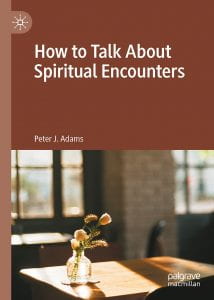While a sizeable proportion of people (varying between 30-60%) admit to having had some form of spiritual encounter, many struggle to speak with anyone else about them. Some might choose to avoid talking about them altogether, even to those who are closest to them.
For those without any religious affiliation, when they do manage to pluck up the courage to talk about such experiences, they might start by saying something like: “you may think I’m crazy but…” or, “don’t laugh but…” or, “please don’t think I’m a freak but…’.”
When on the verge of talking, they realize they are going to have to talk in a vague and slushy way, and that leads on to worries about being judged. To them it feels as if they do not have permission to talk this way.
Such reluctance is curious. It suggests that many of us are fearful of being laughed at, ridiculed or seen as mentally deranged. It also suggests we should be careful about who we might choose to talk to about them.
So, what might explain people’s reluctance to talk about spiritual encounters, particularly when they are seen as major positive events?
One possible explanation concerns the way describing such encounters involves changing and reinterpreting them in ways that fails to do any justice to the full force of how they were experienced. Once the description is out there, the experience becomes public property and no longer safeguarded in the private spaces of one’s mind.
Another possible explanation is that such inward events are difficult to put into words. Spiritual and mystical encounters by their very nature are considered “mystical”, meaning we see them as essentially unfathomable and indescribable.
This suggests that attempts to describe them will immediately run up against the limitations of language. These experiences are so inward-oriented, so subtle, so ethereal that language, as we ordinarily use it, is simply not equipped to give adequate expression to what they are about.
Perhaps, in modern times, our use of language has become so specific and purpose-driven that the soft and open ways in which we talk about spirituality are perceived as no longer legitimate.
Another related possibility is that, for whatever reason, we lack the knowledge and skills required to speak effectively about such matters. An attempt to describe a spiritual encounter requires a special way of speaking, a special use of language, but we have, in modern times, lost the ability to talk this way, or we have somehow missed out on opportunities to learn what is required.
However, despite claims that spiritual encounters are inexpressible, many people still manage to have a lot to say about them; recognizing them as indescribable has not stopped people from attempting to talk about them. Mystics in both Eastern and Western traditions have been writing about their experiences throughout recorded history.
For those writing about spirituality, despite the reported difficulties in conveying spiritual encounters, many still choose to persevere with some sort of expression. If we must be silent about that which we cannot speak, then there seems to be lots of people willing to violate such a prohibition
Indeed, the times I’ve had the opportunity to talk with people about their encounters, I’ve been repeatedly impressed by how capable they are at providing spontaneous descriptions. For many, despite seldom having—or, for some, never having—openly described these experiences, they still manage to talk about them in imaginative and expressive ways.
Accordingly, in tackling our general reluctance to talk about spiritual encounters, two aspects need to be considered: first, the skills we require to talk effectively about them and, second, the general environment in which we speak.
In the book, How to Talk about Spiritual Encounters, I address both these issues by examining the rhetorical skills and abilities required for this special form of speaking and by exploring ways in which to create is a warmer, safer, more supportive environments for acquiring and practicing these skills.
Everyone can benefit from talking about their spiritual encounters, and, to achieve this, we need to create spaces where ordinary people feel less self-conscious and more relaxed and open to both talking about them and listening receptively.
For more, see: How to Talk about Spiritual Encounters
Text and photo by Peter J. Adams


Recent Comments